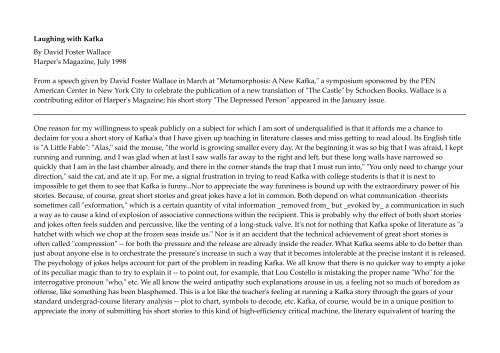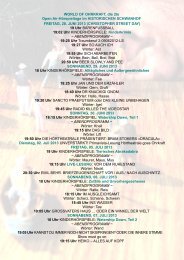Materialsammlung - Theater Marburg
Materialsammlung - Theater Marburg
Materialsammlung - Theater Marburg
Sie wollen auch ein ePaper? Erhöhen Sie die Reichweite Ihrer Titel.
YUMPU macht aus Druck-PDFs automatisch weboptimierte ePaper, die Google liebt.
Laughing with Kafka<br />
By David Foster Wallace<br />
Harper's Magazine, July 1998<br />
From a speech given by David Foster Wallace in March at "Metamorphosis: A New Kafka," a symposium sponsored by the PEN<br />
American Center in New York City to celebrate the publication of a new translation of "The Castle" by Schocken Books. Wallace is a<br />
contributing editor of Harper's Magazine; his short story "The Depressed Person" appeared in the January issue.<br />
One reason for my willingness to speak publicly on a subject for which I am sort of underqualified is that it affords me a chance to<br />
declaim for you a short story of Kafka's that I have given up teaching in literature classes and miss getting to read aloud. Its English title<br />
is "A Little Fable": "Alas," said the mouse, "the world is growing smaller every day. At the beginning it was so big that I was afraid, I kept<br />
running and running, and I was glad when at last I saw walls far away to the right and left, but these long walls have narrowed so<br />
quickly that I am in the last chamber already, and there in the corner stands the trap that I must run into," "You only need to change your<br />
direction," said the cat, and ate it up. For me, a signal frustration in trying to read Kafka with college students is that it is next to<br />
impossible to get them to see that Kafka is funny...Nor to appreciate the way funniness is bound up with the extraordinary power of his<br />
stories. Because, of course, great short stories and great jokes have a lot in common. Both depend on what communication -theorists<br />
sometimes call "exformation," which is a certain quantity of vital information _removed from_ but _evoked by_ a communication in such<br />
a way as to cause a kind of explosion of associative connections within the recipient. This is probably why the effect of both short stories<br />
and jokes often feels sudden and percussive, like the venting of a long-stuck valve. It's not for nothing that Kafka spoke of literature as "a<br />
hatchet with which we chop at the frozen seas inside us." Nor is it an accident that the technical achievement of great short stories is<br />
often called "compression" -- for both the pressure and the release are already inside the reader. What Kafka seems able to do better than<br />
just about anyone else is to orchestrate the pressure's increase in such a way that it becomes intolerable at the precise instant it is released.<br />
The psychology of jokes helps account for part of the problem in reading Kafka. We all know that there is no quicker way to empty a joke<br />
of its peculiar magic than to try to explain it -- to point out, for example, that Lou Costello is mistaking the proper name "Who" for the<br />
interrogative pronoun "who," etc. We all know the weird antipathy such explanations arouse in us, a feeling not so much of boredom as<br />
offense, like something has been blasphemed. This is a lot like the teacher's feeling at running a Kafka story through the gears of your<br />
standard undergrad-course literary analysis -- plot to chart, symbols to decode, etc. Kafka, of course, would be in a unique position to<br />
appreciate the irony of submitting his short stories to this kind of high-efficiency critical machine, the literary equivalent of tearing the

















